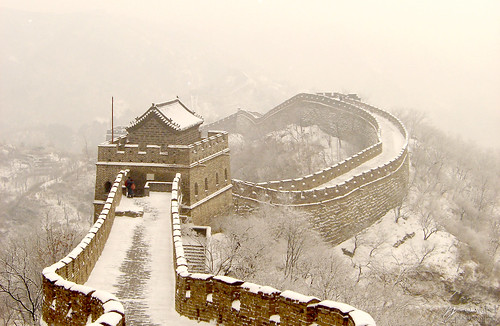The Needham Question
If, like me, you don't know a lot about Asian history I suppose the question is:"What on earth is the Needham Question?" It's the other Needham Question that's the interesting one. It's something I'd hear every so often at school. It's well known that the Chinese invented masses of things before they were known of in the West. Not simply famous things like gunpowder and paper, but also other like harnesses for horses which had a huge effect on the west when they arrived. In the case of the horse collar in the ancient period the way an animal pulled a plough was to have a collar round its next so the harder it pulled the more it choked itself. By putting a harness around your horse you enable a lot more horsepower, and so you can do much more with the same number of animals. China seems to have been a hotbed of innovation in the ancient world, and this particularly impressed Joseph Needham, a biochemist at Cambridge University. So the question he asked was this:"Why, given China's amazing technological achievements, did the Chinese fail to develop modern science?"
I bring it up because it was the subject of a recent discussion on the BBC's In Our Time, which you can listen to if you have RealPlayer installed on your computer. I found it fascinating because it brought up two contradictory problems.
One is that I don't think it's helpful to to say China"failed" to develop modern science. I may have done a disservice to Needham using that exact word, but the basic assumption is that because modern science rests upon previous discoveries and that it's defined by interrogating the modern world, that it's an inevitable conclusion. No one on the panel took this line which means there is a very interesting discussion asking"What exactly is the relationship between science, technology and society in ancient China?"
The contradiction is that if, as I do, you don't see science as an inevitable course then how do you reconcile that with the observable fact that China was more technologically advanced? The reason the Needham Question arises at all is that it is plainly observable that the West lagged behind China in discovering or acquiring the same technologies. Again this would appear to be a question about how scientific knowledge interacts with society. One part of the discussion is upon the arrival of the Jesuit missionaries, who naturally felt they were superior to the Chinese as they had the word of God. How can you maintain this belief in your own superiority when you're surrounded by more advanced sciences? One possible answer is that the Jesuit position was they weren't inferior. They had Greek mathematics which the Chinese lacked, so while the Chinese may have had technology the West had understanding.
The discussion concludes with a look at how history is coloured by the present. In the nineteeth and twentieth centuries there was a need to discuss China's"failure". It was no longer a major power. The next couple of centuries and the expansion of China's economy may change the historical question to ask why the West could only briefly lead China in technology.
You can listen to people who know far more about ancient China than me talk about this at the BBC In Our Time website. The programme lasts about three-quarters of an hour. You can also visit the Needham Research Institute to see current research.
